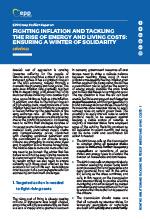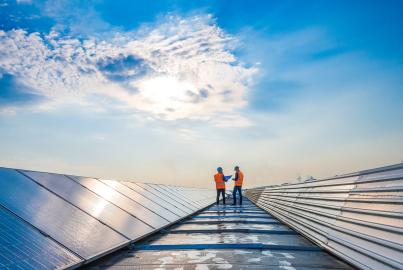EPP Group Position Paper on Fighting inflation and tackling the rise of energy and living costs: ensuring a winter of solidarity

Russia’s war of aggression is causing immense suffering for the people of Ukraine and constitutes a direct attack on European values. It has a significant impact on the EU’s economy, notably through a dramatic rise in energy and food prices. The euro area inflation rate gradually reached 9.1% in August 2022, with almost half of its Member States suffering from double-digit rates, some hitting as high as 25% inflation. In addition, and due to the indirect impact of high energy costs, most indicators of core inflation have risen and inflationary pressure is fuelled further by the devaluation of the euro exchange rate. All this adds to the challenges our economies are already facing due to the COVID-19 pandemic. Companies need to rethink their strategies because of increased production costs due to higher raw material costs, constrained supply chains and transport/energy prices combined with changing consumer behaviour and the commitment to our climate targets. Citizens are struggling to make ends meet and, in addition to low-income households, the middle class is more and more affected. We need to be honest: the winter that lies before us will not be easy. Ukraine needs us to stand united in these testing times. And to remain united we also need to ensure solidarity with those most affected by the economic fall-out of this war. More Europe must be a part of a comprehensive solution addressing our imminent challenges.
1. Targeted action is needed to fight rising costs
The rising cost of living is already making millions of Europeans face tough choices, and winter will only exacerbate this. As there is a lack of supply and a gradual slowdown in demand, government measures all over Europe need to strike a delicate balance between reaching those most in need without unnecessarily fuelling inflation even further. Against this background, the EU has a coordination role to organise the security of energy supply, stabilise the price levels and to help businesses to survive and grow. The key question is how the EU can best enable, facilitate and support such targeted support measures, which organise solidarity in and between Member States.
The existing frameworks allow Member States to apply reduced rates on certain motor fuels. The possibility to apply 0% VAT rates to certain products needs to be assessed against keeping a stable source of revenue. A majority of Member States have employed some of the existing flexibility provided by EU legislation in recent months, but more can be done. Joint and coordinated EU action is needed.
- The EPP Group calls on the Commission to consider giving all Member States space to introduce further temporary exemptions or reductions of excise duties and energy taxes to alleviate the burden on households and businesses.
- The EPP Group calls on Member States to consider exempting staple foods (such as unprocessed fruit and vegetables and dairy products) from VAT in the entire EU, as long as the crises continues; and calls, in this regard, on the Commission and Member States to provide effective monitoring and enforcement by market surveillance and competition authorities to ensure that the reduction is passed to the citizens.
- The Commission should make sure that all requests by Member States for temporary exemptions or reductions are dealt with quickly and consistently. All relief action needs to actually reach households and businesses.
- For better coordination of Member States' policies, the EPP Group calls for a quick response forum: the establishment of a monthly EU Ministerial ‘Cost of living’ Council meeting bringing together ministers from across relevant policy areas, reporting to the European Parliament. This would allow to identify best practice and mitigate the potential cross-border impact of divergent national policies.
- The EPP Group supports the Commission’s proposal to establish a temporary emergency cap on market revenues obtained from the sale of electricity at European level. The plan aims at a cap for revenues of non-gas and non-hard coal electricity producers as well as an additional reasonable levy on fossil fuel company surplus taxable profits and for this temporary solidarity to contribute to reduce energy costs for households and businesses. The EPP Group criticises the fact that this proposal comes in the form of a Council Regulation (Art 122 TFEU), excluding the legislative role of the European Parliament. Time pressure is no excuse to circumvent democracy!
- Expects from the Commission must ensure a close and thorough investigation of the measures taken up by Member States based on the proposals of the Commission to ensure compliance with the objectives of burden-easing for final electricity consumers; the EPP Group stresses the importance of market-based interventions, such as temporary price caps that do not disturb the functioning of the Internal Market of the European Union, do not destroy incentives for energy savings and do not hinder investments into renewable energies and infrastructure projects.
- We support the idea of intervening in the ETS, which will generate the necessary money and at the same time mitigate the ETS price. This is not an unwanted side effect but something we desperately need in these times of crisis. We want to contribute to the reduction of the electricity price and energy costs for industry. At the same time, we strongly commit to the position of the European Parliament on the 2030 climate target. Member States' fiscal policy must play a relevant role in the current inflationary context: fiscal efforts should focus on the lowest income households and companies most vulnerable to economic shocks. Moreover, they should be temporary in nature so as not to accelerate the structural deficit and to avoid distortions in price signals.
- The EPP Group notes that several Member States, where fiscal space allows, carried out minimum wage increases in line with national practices, and in particular with collective bargaining, to reduce the impact of the double crisis on workers and households in a targeted manner and to help address labour shortages in certain sectors, without creating a wage-price spiral.
- The EPP Group calls for the organisation of a follow-up to the Porto Social Summit to discuss and further act on the social and economic challenges of this extraordinary situation and to protect a growing number of people in Europe from the increasing risk of poverty. The EPP Group calls for more and harmonised tax incentives for research and development to achieve technological leadership and - at the same time - find solutions to save energy, improve energy supply and the roll-out of renewable energy infrastructure.
2. Monetary Policy
In respect of the European Central Bank’s independence, the primary objective of monetary policy is to maintain price stability, which is thereby a powerful tool to fight inflation. The European Central Bank has traditionally had a strong track record in keeping inflation at bay. We share the observation that higher interest rates have a two-sided impact on lowering inflation expectations and increasing borrowing costs at the same time. The same strategy should be followed by the central banks of the non-euro Member States.
- The EPP Group calls on the ECB to keep up the determination to raise interest rates as long as the ECB's forecasts remain unchanged while taking the Proportionality Assessment into account. We take note of the launch of the Transmission Protection Instrument (TPI).
- The ECB has to develop a credible communication strategy backed up by swift and tangible action to convince European citizens that the ECB means business when fighting inflation.
- While focusing on price stability, the ECB needs to monitor the single currency’s external value and its interaction with other developed economies to avoid an even higher ‘imported inflation’. In this context, the euro’s slide against the Dollar is particularly concerning, given that energy derivatives are traded in Dollars and are becoming more and more expensive for European wholesale buyers. The recent decline in the euro/Dollar exchange rate has therefore become a major contributor to energy price inflation. In order to prevent a further deterioration of the euro’s external value, the ECB needs to act in lockstep with other large central banks, in particular the Federal Reserve.
3. Rethinking energy supply in Europe
An affordable, sustainable and secure energy supply is the key to Europe's future. To achieve this, we need more European energy policy. The reform of the EU's internal energy market must be pursued more consistently; dependencies that are too high need to be avoided and key infrastructure needs to remain in European hands. To keep energy affordable and to achieve climate-neutrality, all options must be on the table. This means above all the expansion of renewable energy, which will reduce energy prices in the medium-term. In the short-term, however, there is a need for major investment in the necessary infrastructure and for transition energies to avoid energy supply disruptions.
- Investments in renewable energy, energy efficiency and energy infrastructure, particularly cross-border projects, should be accelerated to avoid future energy shocks to the EU economy, including through investments from the EU Recovery Plan and RePowerEU.
- The EPP Group calls on the Commission to present a concrete legislative proposal for fast-track procedures for key cross-border energy infrastructure - interconnectors enabling alternative energy supply especially need to be prioritised. By upgrading our energy and storage infrastructure and our cross-border interconnection, Europe can be more self-sufficient and can ensure a better functioning energy market and supply of security. Europe shall never again depend on Russian energy.
- The EPP Group calls for the creation of a fully integrated Internal Market for Energy through more interconnectors, as the example of the one connecting the Iberian Peninsula with France shows, and better trading platforms, which will alleviate price pressure on businesses and consumers alike. The EPP Group believes that a functioning Single Market for Energy is a better tool to ensure the security of energy supply in the long-term than ad-hoc emergency decisions.
- The Commission and Member States should urgently establish the necessary Solidarity and Compensation Mechanism and swiftly implement the new storage obligations.
- We call for the use of voluntary common purchases of energy products to lower prices in negotiations and to ensure security of supply for all Member States.
- In order to fight high energy prices, the Commission should urgently propose a review of the EU Energy Price Building Mechanism. This review should improve the functioning and resilience of the EU wholesale electricity market and benefit consumers and businesses, especially the most vulnerable ones. Measures not adopted at an EU level that prevent the functioning of the EU Internal Market and free competition should be avoided.
- To speed up the transition it is necessary, in particular, to mitigate the electricity price. We need electricity to decarbonise industry, buildings and transport and to be less dependent on Russia.
- Member States should do whatever it takes to maintain or increase their domestic energy production. The postponement of nuclear power and coal phase-out are not taboos and need to be considered by Member States to ensure the supply of security and decrease energy prices. The postponement of fossil fuel phase-out must be temporary for as long as the current crisis lasts and be accompanied by a concrete calendar. Existing infrastructure needs to be upgraded to create a proper hydrogen backbone. The hydrogen ramp-up must be accelerated by scrapping bureaucracy and by allowing all renewable energy plants to produce renewable hydrogen. The use of low carbon energy technologies can help mitigate the energy sectors’ impact on climate change, while at the same time ensuring a resilient, strong and diversified energy supply.
- We need a new approach to diversifying energy supply, which should lead to an EU energy diplomacy approach with partner countries and international fora to prevent market failures – and to increase energy security for all. The EPP Group calls for a Hydrogen Import Strategy in order to ramp-up and diversify hydrogen imports from third countries.
- The EPP Group calls for the establishment of a European Energy Resource Inventory collecting Members States’ information on their available and potential energy resources for better coordination, an acceleration of necessary procedures and optimisation of the energy grid. On this basis, Member States could develop their ‘go-to’ areas according to the RePowerEU plan.
4. Diversifying supply and value chains
The energy and digital transition increases the demand for certain types of raw materials substantially; while, at the same time, the COVID-19 crisis and the Russian war have led to disrupted supply and value chains creating supply shortages and rising production costs. By working with international partners, we need to ensure the diversification of supply, boost new Free Trade Agreements, invest in our trade relations through new energy alliances (including on raw materials and advanced technologies), harness European market power through joint procurement and swiftly ratify key trade agreements.
- To strengthen the international dimension, the EPP Group calls for a revitalised, pro-active and targeted trade policy, including strengthening trade relations with the European Free Trade Association countries, including on the issue of access to (critical) raw materials. We want a renaissance of cooperation with democratic partners around the world: now is the time to strengthen our relationships with reliable and likeminded partners with the aim of swiftly concluding Free Trade Agreements which are under negotiation.
- At the same time, the EU needs to shorten supply chains and re-shore essential production procedures to increase resilience and strengthen its strategic autonomy. The development of a European market for secondary raw materials will also increase the availability of valuable inputs for European industry, reduce the environmental impact of their management and increase the circularity of our economy. The EPP Group calls for a strong Strategy on Raw Materials and Critical Raw Materials (CRM). We need an in-depth analysis of demand and supply, and to adopt measures to alleviate supply bottlenecks - and increase funding, including tools of risk funding. We call for the identification of projects of strategic importance and the creation of an Important Project of Common European Interest (IPCEI). Taking an example from the energy sector, these projects should profit from fast permitting procedures. Sustainable mining activities and sourcing possibilities in Member States should be further explored. We strongly welcome the Commission’s efforts to conclude new Critical Raw Material partnerships with African countries.The EPP Group calls on Member States not to prohibit the exploration or sustainable mining activities in their land.
- The EPP Group calls to explore the formation of a pan-European supply chain in order to enhance autonomy in critical sectors (such as semiconductor manufacturing). Nearshoring to the CEE countries could help curb disruptions in the future as well as lead to a greater diversification in supply chains.
5. The cost of doing business
High energy prices, disrupted supply chains, the transition towards climate neutrality, as well as new legislation in the pipeline - our businesses are bearing the brunt of all these developments. Taken together, their cumulative effect may endanger our businesses and the jobs they provide. This might also mean that business as usual is no longer sustainable.
- The EPP Group calls to immediately ease the burden on businesses by invoking a regulatory moratorium and delay those acts that would unnecessarily increase costs for businesses already under strain (such as REACH).
- The EPP Groups calls on the Commission to provide a sector-by-sector analysis of the cumulative effect of higher energy and raw material prices, new legislation and the impact of the war. We want to see a comprehensive, cross-sectoral impact assessment on revisions of existing legislation as well as on new legislation on energy.
- The EPP Group calls on Member States to use the additional tax revenues based on higher energy prices directly to relieve the burden on citizens and SMEs.
- The EPP Group supports deregulation of installation of renewables, particularly for households. Cutting red tape is important for the increase of energy production in private sector and it would also motivate households to manage energy efficiency. We urge Member States to decrease the regulatory burden for the installation and uptake of renewable energies; in particular, by removing administrative barriers and simplifying permitting and calls on the Commission to publish best practice examples of unbureaucratic installation and operating solutions for renewable energies as benchmarks in a "Guideline for the Rapid and Unbureaucratic Expansion of Renewable Energies" and to organise an exchange of experience between the Member States. We need a new approach to better regulation in order to deliver policies at the lowest possible cost for society. The Commission has to finally deliver a proactive implementation of the One-In-One-Out principle, which should be included in the preparatory phase of every legislative act.
- As a priority, our policies and regulatory rules must offer assistance to SMEs by cutting red tape. This should be achieved through a full post COVID-19 ‘cutting red tape’ initiative carried out by the Commission. To this end, we need to increase investments in the digitisation of public administration, including through the digitalisation pillar of the Resilience and Recovery Facility. Particularly, the access to finance for SMEs facing difficulties with rising energy costs needs to be improved.
- In times of crisis, it is the Commission’s role to ensure the functioning of the Single Market, guaranteeing the free movement of workers, goods and services especially in cross-border regions. COVID-19 and the Russian war have proven Europe must be better prepared for moments of crisis and act united. To that end, the EPP Group strongly welcomes the Proposal of the European Commission for a Single Market Emergency Instrument.
- The EPP Group calls for the Single Market to realise its full potential to benefit European consumers and boost productivity and competitiveness by removing existing barriers, such as special technical requirements at national level and incorrect implementation of EU directives – and to improve the problem-solving mechanism “SOLVIT”, thereby contributing to the reduction of the overall price levels.
- The EPP Group call on Member States to improve labour market participation by removing obstacles, including in areas such as taxation, social policy and recognition of qualifications.
- Member States are encouraged to reform their educational systems to make them more relevant for actual labour market needs. Vocational education systems have a strong track record in teaching relevant skills. Easier access to swift reskilling and upskilling is essential.
- The current crisis shows the importance of food self-sufficiency. The EPP Group is convinced that we must do all we can to improve food self-sufficiency, including of inputs in agriculture such as fertilisers and feed. At the same time we must avoid further European legislation that endangers - or risks endangering - our self-sufficiency.
6. EU budget and financial support
- The EPP Group calls to make full use of all means available in the current Multiannual Financial Framework and to reuse the entire amount of the 2014-2020 de-commitments to channel funds to necessary investment and help ease the supply shortages.
- The EPP Group demands an urgent revision of the MFF to accommodate the increased financing needs following an in-depth analysis of the implications of the war on existing EU policies, as well as the shift to new political priorities and emerging needs. The proposal for the revision should come as soon as possible and no later than the first quarter of 2023. The EU's budget needs to become more agile in order to react to crises that emerge during the seven-year duration of the financial planning, while preserving funding for the existing programs.
- Serious debate on the future financing of the EU budget is needed and the introduction of the new own resources should take place as set out in the legally binding Inter-Institutional Agreement of 16 December 2020. The EPP Group urges the Commission to present proposals for a second basket of new own resources by the end of 2023 and calls on Member States to cooperate. Those additional revenues from the new own resources are necessary to cover at least the repayment of the Recovery Instrument costs/ the costs related to NextGenerationEU, as well as to ensure sustainable financing of the EU budget on a long-term basis.
- Within the framework of existing EU financing programmes, budgetary resources should be better put to use in order to tackle the impact of the inflation on our citizen and companies, particularly SMEs.
- An increase in the level of the EU guarantee in the InvestEU programme could boost investment in support of European SMEs, including for the purpose of capital support, and the creation of a dedicated window for companies affected by the consequences of the war, and for projects related to energy independence, which includes supporting the energy and climate targets in this programme, financed with fresh funding.
- Solidarity support for Members States to address rising energy costs has to be linked with the conditionality to make necessary efforts to detach their energy supply from Russia.
- Member States and the Commission should continue to make best use of the State Aid toolbox, including the new State Aid Temporary Crisis Framework, as a time-limited departure from the status quo.
7. Saving energy
Reducing our energy usage is crucial to fight rising gas and oil prices. Ambitious EU-wide policies and programmes for energy-efficient housing and buildings must be based on meaningful public-private partnerships. Therefore, there should be greater incentives and public investment around retrofitting or renovating to make properties, factories, and offices more energy efficient.
- The EPP Group strongly believes that energy efficiency across all sectors will be crucial both in the short-term to mitigate the effects of energy shortages, but also in the long-term to reduce consumer and industry costs.
- The EPP Group calls on Member States, coordinated by the Commission, to develop an Energy Conservation Guidance for businesses, industry and households so that they can prepare for the winter ahead and improve energy efficiency. For households, as well as advice on energy usage, this should include pro-active information on funding schemes for home renovations.
- Rooftop solar panels, heat pumps and small wind turbines across the EU need to be ramped-up with a view to reducing the use of gas. All administrative barriers should be simplified or removed and significant subsidy schemes made available by Member States.
- The EU should make available detailed information campaigns on practical, effective, and realistic saving tips around the cost of living and energy costs in all languages, including information on consumer rights across the EU.
We call for more support for renovations. Deep renovations, such as the insulation of buildings, incur significant cost that the majority of households cannot afford. The EPP Group therefore calls for easier access to bank lending. We encourage more environmentally friendly initiatives such as vouchers for travellers who use railways or public transport and tax incentives to promote recycling and tax credits and deductions for renovation of materials and energy efficiency of buildings and installations. We call on the Member States to consider premium incentives in favour of consumers, especially micro and small businesses and households that make efforts to save energy; for example, through cutting gas and electricity, especially during peak hours.

Position Paper on: "Fighting inflation and tackling the rise of energy and living costs: ensuring a winter of solidarity"
1 available translation
EnglishOther related content

6 / 54




